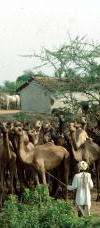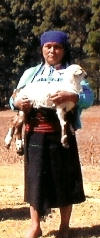Bonn Workshop on the Future of Animal Genetic Resources
A workshop on “The Future of Animal Genetic Resources: Under Corporate Control or in the Hands of Farmers and Pastoralists?” was held 16-18 October, 2006, in Bonn, Germany. While concentration in the livestock breeding industry is fast increasing, and exotic breeds are transferred to the South in large quantities, local smallholder livestock keepers are losing access to grazing lands. The recent large scale biofuel plantations may add to the pressures.
Seventy percent of the world’s poor keep livestock, while factory farm products are generally not within immediate reach of the poor. The loss of breeds is accelerating, and livelihoods are lost as well. Participants have emphasized the importance of livestock keepers’ rights to their breeds as well as to the productive resources (e.g. grazing land, water, animal health services, and credit) needed to keep these breeds that have the capacity to produce under the often harsh local environments. Local breed development should become a priority in poverty alleviation programmes.
The 45 participants from 20 countries came from livestock keeping communities, civil society organizations, FAO, the Swiss government, national focal points for animal genetic resources from South and North, the International Livestock Research Institute, universities, donors, and breed conservation organizations. The workshop, which was organized by LPP together with the LIFE Network.
The workshop was held in preparation of the International Technical Conference on Animal Genetic Resources that will be held in Interlaken, Switzerland, in September 2007.
More information: 45 kb
India’s herding communities: Affirm our customary grazing rights!

On this year’s Human Rights’ Day, 10th December, representatives of herding communities from all over India rallied in Delhi to draw attention to their plight and discuss strategies for reviving their customary grazing rights. For hundreds of years these mobile livestock keepers have held together rural life by providing draught animals, milk, meat, wool, manure, and general ecosystem services.
But in the last several decades these diverse and colourful people that include the Raika and Gujjar of Rajasthan, the Maldhari of Gujarat, the Gaddi in Himachal, Bakkarwal in Kashmir, Van Gujjar in Uttaranchal, Changpa in Ladakh, Golla in Orissa, Kuruba in Karnataka, Toda and Konar in Tamil Nadu, and many more, have felt the squeeze of “development” and of generally unsympathetic government policies. The establishment of wildlife sanctuaries and national parks, joint-forest management schemes, allotment of common land for commercial plantation or bio-diesel cultivation, expansion of irrigation agriculture are all developments that have constricted their customary grazing areas.
Click here for more.
Papers on livestock keepers’ rights in Spanish

The following papers on livestock keepers’ rights were presented by Ellen Geerlings at the “VI Simposio Iberoamericano sobre la Conservación y Utilización de Recursos Zoogenéticos“, Chiapas, México, 7-10 Nov 2005.
Köhler-Rollefson, Ilse, Constance McCorkle, Jacob Wanyama and Evelyn Mathias. 2005. “Investigación en biotecnología animal y derechos de los criadores de ganado” (Animal biotechnology research and livestock-keepers’ rights). 64 kb
Mathias, Evelyn, Ilse Köhler-Rollefson, and Jacob Wanyama. 2005. Razas locales y derechos de los criadores de animales 165 kb.
English version, “Pastoralists, local breeds and the fight for Livestock Keepers’ Rights” presented at the PENHA 15th Anniversary Conference “Pastoralism in the Horn of Africa: Surviving against all odds”, 29 Sep 2005. 77 kb
- Go to the previous page
- 1
- …
- 66
- 67
- 68
- 69
- 70
- 71
- 72
- …
- 82
- Go to the next page
